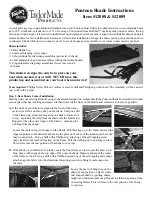
Commands in DSR Application Subsystems
Error Analysis Commands
312
Agilent 81250 Parallel Bit Error Ratio Tester, Programming Reference, March 2006
Error Analysis Commands
The Error Analysis Commands are used to report and reset bit errors
on specific ports or terminals.
:FETCh:ERRor:ANY?
Syntax
:<Handle>:SGENeral:
PDATa(*):
FETCh:ERRor:ANY?
:<Handle>:SGENeral:
PDATa(*):TERMinal(*):
FETCh:ERRor:ANY?
Return Value
Returns 0 for no errors, 1 if an error was found for the specified data
port or terminal.
This can be used to increase program speed. Uploading of memory
segments can be completely avoided, when it is known, that there are
no errors at all.
Example
:_test:SGEN:PDAT1:FETC:ERR:ANY?
:_test:SGEN:PDAT1:TERM2:FETC:ERR:ANY?
might return:
0
:FETCh[:ECOunt]?
Syntax
:<Handle>:SGENeral:PDATa(*):FETCh [:ECOunt ]? [(<TermChannelList >) |
<PSUM>]
Parameters
<PSUM>
Generates an accumulation of the received bits count
(Accumulated Number of Bits) and the error bits count (Accumulated
Number of Errors) for all terminals of the whole port.
<TermChannelList>
Selects specific terminals of a data port. If the
argument is omitted, all measured values within the specified port are
reported.
In the error count mode this query returns the number of received bits
and the number of erroneous bits. The counters are set to zero after a
stop/start request or reset. The results are contained in a comma-
separated list.
Artisan Technology Group - Quality Instrumentation ... Guaranteed | (888) 88-SOURCE | www.artisantg.com
















































